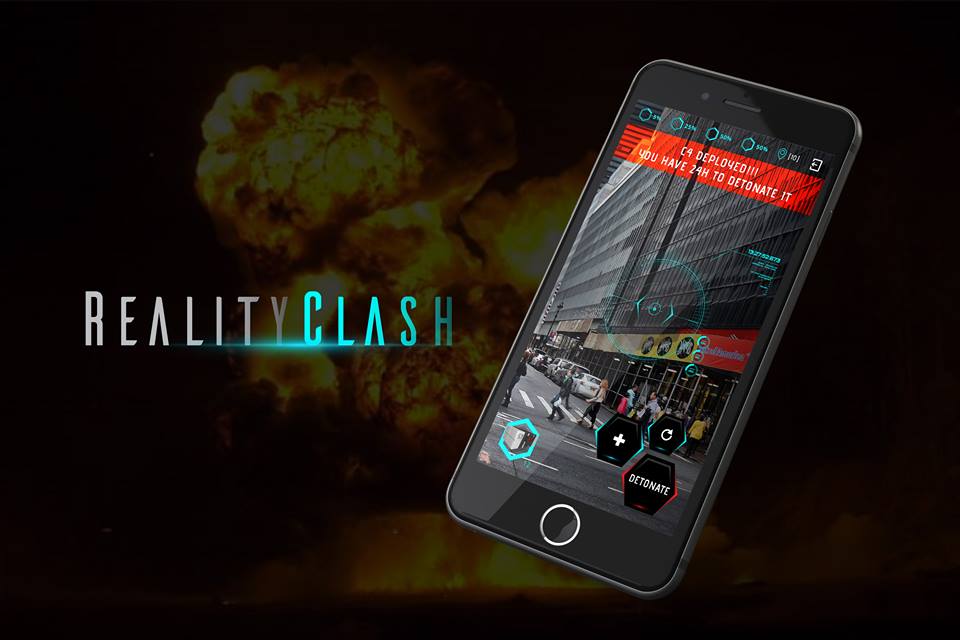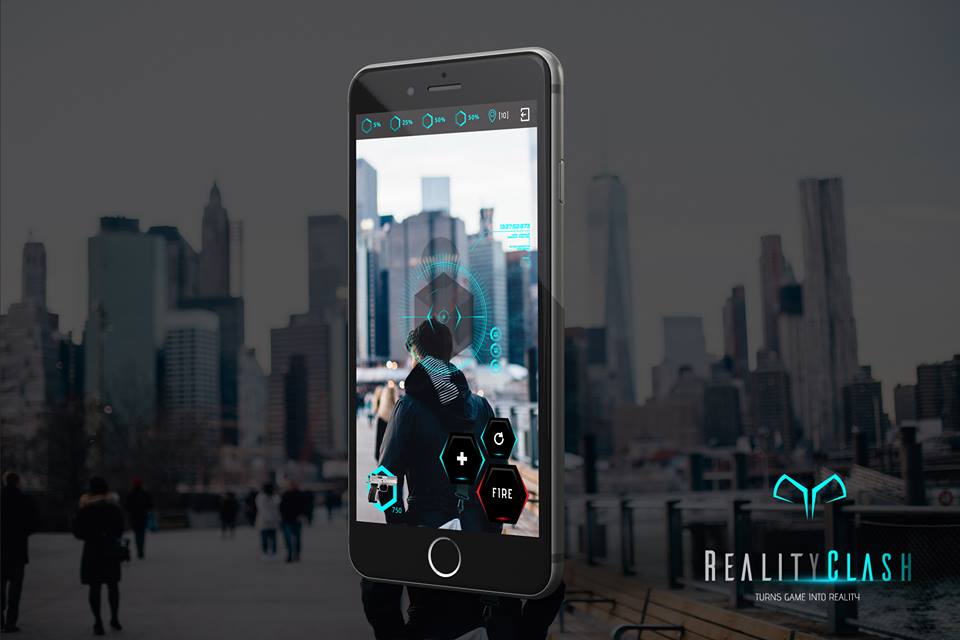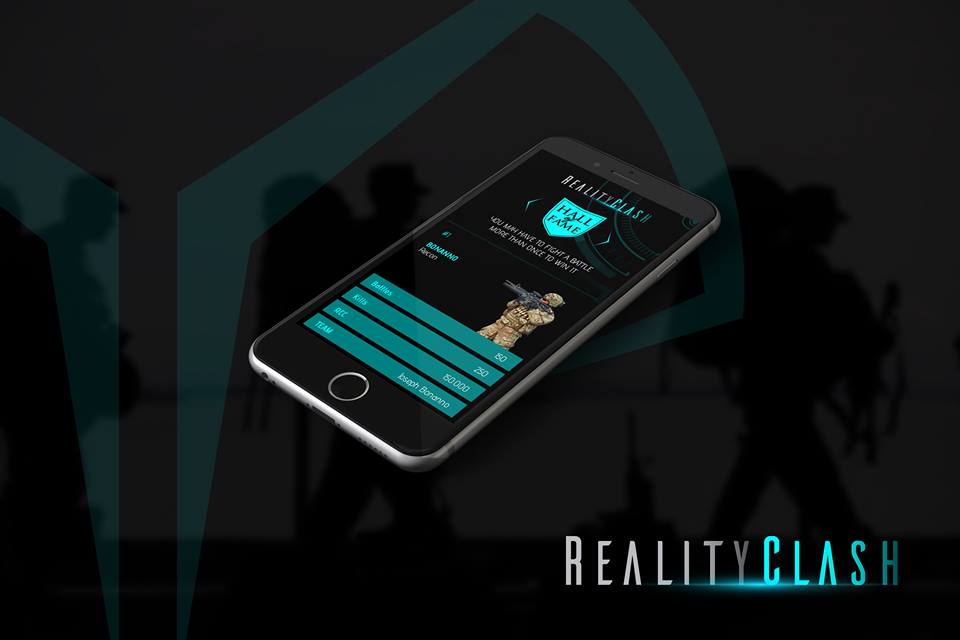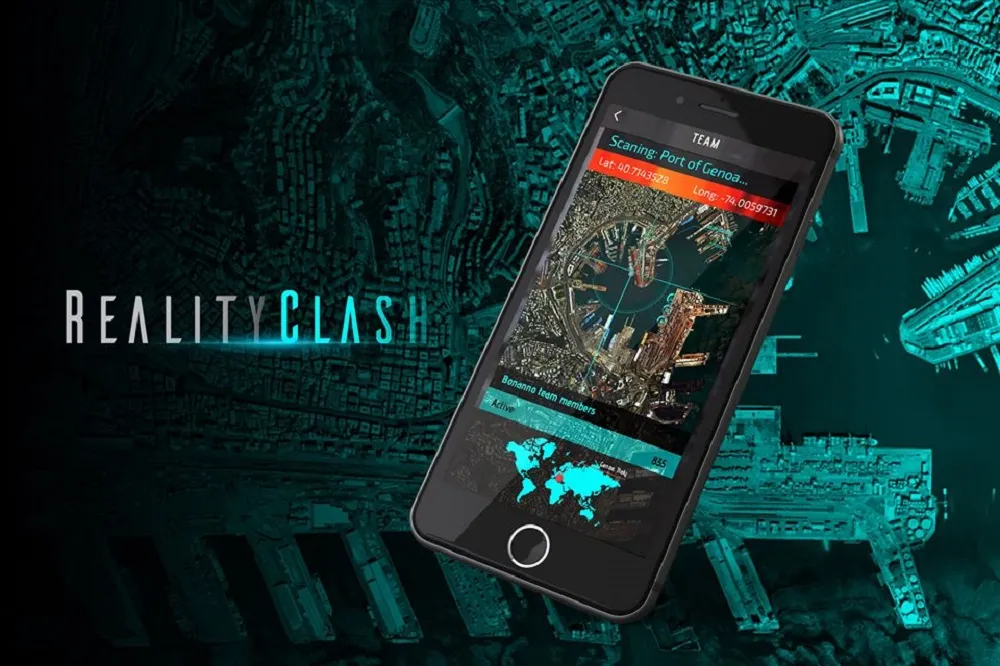The internet is abuzz lately about cryptocurrency and the blockchain. Naturally, it was only a matter of time before a developer decided to tap into each of them, together, for game development — a mission taken on by Reality Gaming Group with their debut mobile AR game, Reality Clash.
Similar in ways to Ingress and Pokemon Go, Reality Clash will be a free-to-play AR game for iOS and Android devices. According to a press release, it will leverage users’ phone camera to render an augmented overlay onto the real world using geolocation features. This means you’ll have to travel to real world locations and battle other players face-to-face.
To get a better understanding of the game, its mechanics, and how it all relates to cryptocurrency and the blockchain, we did an email Q&A with Tony Pearce, Co-Founder of Reality Gaming Group.
UploadVR: Reality Clash combines, AR, multiplayer, geo-location, weapons trading, crypto and the blockchain – what’s the best way to describe the game to a newcomer?
Tony Pearce: We want to give gamers the opportunity to experience the exciting features of augmented reality, multiplayer combat, virtual arms dealing and competitive battles – all on their mobile phone. Reality Clash will allow players to use skill and teamwork to conquer their neighbourhoods and climb the local, regional and world rankings.
Players will be able to build up an arsenal of powerful weaponry, which can be used in game to defeat enemies or speculated on with users of the game’s trading platform acting as virtual arms dealers. Ownership of these assets is backed by a blockchain-based trust list, which will be deployed via the Ethereum network. The global increase in digital asset trading in games such as CS:GO, DOTA 2 and World of Warcraft has shown that gamers want to be able to craft, trade and monetise their in-game content and we aim to do this, but with true ownership of these assets backed by a transparent and immutable blockchain.
UploadVR: How do you approach combining all those elements into a single game?
Tony Pearce: It is challenging, of course. Thankfully, we have a brilliant UK development team headed up by Paul Mottram and Ben Hebb. Development has also been aided by the arrival of BAFTA Breakthrough Brit Henry Hoffman, who joined the team in October. We also have an international team of developers in both Denmark and in the Philippines, who have been working on the trading platform and digital asset elements of Reality Clash.
Game development can be, and often is, developed in phases by separate teams. With consideration of the varying game elements involved in Reality Clash, at this stage we have one team working on our weapons trading platform/digital asset accounts and another team focused on building the game itself. This allows our devs to retain focus on individual development goals, but does mean that communication between the separate teams has to be structured and coordinated at all times.
We are really fortunate to be developing the game at a time when both AR and blockchain technology are really starting to take off in the mainstream. We have a lot of work to do, but this will coincide with ongoing improvements in AR and geo-location tech, as well as an increasing amount of developers using the blockchain.

UploadVR: What have been the key challenges in terms of AR and geo-location?
Tony Pearce: The established geo-location services themselves and their reliability has been a key challenge. Our developers undertook extensive research into the mapping services that are currently used by game developers and we will continue to improve this element as we get closer to game release. Besides the accuracy of GPS and mapping data, the issues of dealing with real world situations, such as people walking in front of the player’s camera, are events that are beyond our control, but something we have to deal with to enable us to deliver a believable, coherent gaming experience.
In relation to the AR side of development – there have been challenges that all developers face: the technology sometimes struggles to recognise distance between the camera and the object, whilst also struggling with the placement of virtual objects in relation to real-world floors and walls. The latest AR Kits for iOS and Android and some dedicated hardware on the devices does make things easier, plus we have a strong partnership with Unity.
There is now major investment behind the AR ecosystem and we just expect things to get better. We also just need to ensure we can feed all these advances into our games/products to maximise the potential of the experiences that we provide to the players.

UploadVR: How does your approach with in-game currency (RCC Gold/Silver) differ from the established virtual currency model used in games?
Tony Pearce: Although virtual currencies have existed in games for a long time, there has never been true user ownership – there has always been a centralised account database which is entirely managed by a 3rd party. Players are not able to move their in-game currency, trade it for other game currency and can only profit from their gameplay via 3rd party providers, with sometimes questionable levels of security.
However, with the rise of distributed ledger technology, smart contracts and cryptocurrency, we are now able to provide gamers with complete ownership of both their in-game currency and digital assets as part of Reality Clash.
RCC Gold is the primary in-game currency for Reality Clash and was distributed to out ICO backers as a means of funding game development. Not only does it act as a payment network that allows players to monetise their gameplay and profit from their digital asset trading (weapons, etc), but it is also the gateway by which gamers (who may not have any experience of cryptocurrency) would be able to learn about the technology.

UploadVR: What role do you see AR having for the future of gaming?
Tony Pearce: Most modern mobile phones are able to run AR applications/games and so the market for these kind of titles is rapidly increasing. We believe that AR will be a sort of ‘stepping-stone’ towards VR, with the technology improving and applications integrating with day-to-day life on a more global basis.
We are already seeing money flowing into the development of AR mobile games and AAA publishers are looking to produce a number of ‘big name’ titles for 2018-2019. We are also excited about seeing the ongoing rise of eSports and believe that there is a market for competitive mobile gaming, which incorporates AR. In fact, physical eSports are something that will inevitably arrive as we realise that we don’t need to be sitting down to play video games. Pokémon Go started off the trend with gamers of all ages going outside with their mobiles to play the game. However, the use of AR in Pokémon Go was actually extremely limited and we aim to make far more innovative use of the tech.
Overall, it’s a very exciting time to be involved with AR and competitive mobile gaming and we’re excited to see innovation from across the industry in the coming years!
Reality Clash is coming to iOS and Android devices from Reality Gaming Group in 2018. Let us know what you think down in the comments below!


























